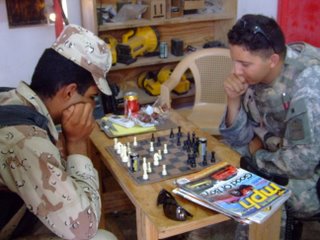REPATRIATE GAMES

One of our tasks in Tal Afar was to keep the Iraqi Army
"in check," a task at which Sgt. Romero often failed
spectacularly. photo by Buck Sargent
We have good corporals and good sergeants and some good lieutenants and captains, and those are far more important than good generals.
-William Tecumseh Sherman
Homecoming, Interrupted
Mosul, Tal Afar, and now the belly of the beast. It was announced this week that our unit, the 172nd Stryker Brigade, has been extended for up to four additional months in Iraq in order to bring additional force to bear on the persistent lawlessness of the capital city of Baghdad. My platoon was already in Kuwait, homeward bound, when we were first notified of this occurrence via Yahoo! News, of all sources. The media, our families, along with anyone else in America who cared knew long before we did that not only were we not returning home as planned following an already mentally and physically draining year in Iraq, but that by the time we finally do we’ll more than have qualified for in-state tuition to Baghdad University.
Of course, not a word of this possibility was breathed to us in recent weeks. Hundreds of our advance party were already home. Many more had already purchased tickets for block leave, had sent home much of their excess gear and equipment at the behest of our command (and at our own expense), and had assured our families and loved ones that the proverbial light at the end of the tunnel was finally shining upon us. And yet, like much of what passes for optimism in the Middle East, in the end it was all little more than a mirage.
Pass the Mustard
I don’t often criticize the Army Powers That Be. For one, it’s not my place to do so, being such a low man on the totem pole; and secondly, I fully realize that the big picture and the soldier’s bottom line are not always going to be in perfect agreement. That being said, I’m going to make a rare exception to my usual modus bloggerandi.
Here’s the setup: The Pentagon pinochle players have demanded more boots on the ground in Baghdad, tout de suite. Our brigade has finished its tour and is in the process of redeploying home. There are no other available units with a comparable level of combat power and recent experience that can as rapidly fill the gap. Ipso facto, voilà, presto: we’ve become the latest unwilling guests in the grand opening of yet another Extended Stay Iraq. For the brass, it’s a no-brainer. But for those affected, all it looks like at the present moment is a heartless non sequitor.
The battalion commander from my Afghanistan tour several years ago once described my former Airborne unit’s similar predicament of shifting redeployment dates as “taking a huge bite of the Army’s shit sandwich and spreading some mayonnaise on it” in order to choke it all down. He had been around the block long enough to know that it was simply a distasteful aspect of military life that is often unavoidable. Even so, I believe we’re going to require a few additional condiments this time around.
485 days and a wakeup. Not many can claim they spent two birthdays in Iraq -- on the same deployment!
The Three P’s
The Army feels free to make last minute decisions concerning our fate because to them we are little more than chess pieces to be easily shifted across the board with even less regard for the human costs that lay behind such actions. My bunkmate’s wife fully expected to hear next from her husband when he landed stateside. Instead, he was forced to drop the bombshell that he wasn’t coming home just yet after all. No one looks forward to that call.
Those of us in uniform expect to have our chains pulled. It’s part of the job, and it’s usually par for the course. But there’s simply no excuse for jerking our families’ around, playing mind games with their expectations. Mental preparation is everything when it comes to enduring the stress of a combat tour, especially for those left behind. To survive a year with your loved one away at war will always constitute a Herculean effort. But to offer no warning whatsoever of even the possibility of such a long tour extension is truly beyond the pale.
Our families will cope as best they can, and we’ll suck it up and drive on, just like we always do. But I don’t think it’s any surprise that we’re livid at the sheer ineptitude of those who purport to lead us. The seven Army Values rammed down our throats in Basic from day one were identified as Leadership, Duty, Respect, Selfless Service, Honor, Integrity, Personal Courage. In lieu of recent events, I believe a new addition is more than warranted: Piss Poor Planning.
All Quiet on the Northern Front
Never before have a single one of the Army’s three active Stryker brigades been mobilized in large numbers in the Sunni Triangle, having seen the majority of their action in the northern-most Iraqi provinces. Three months ago, I was of the opinion that our battalion should have been rerouted to Ramadi following our successful stint in Mosul rather than dispatching still more tankers and Humvee-bound units demonstrably unsuited for that type of counterinsurgency fight. Not surprisingly, my views were overruled by the 300,000 some-odd people in the Army that presently outrank me. Instead we were moved to Tal Afar and its surrounding areas to ride out the remainder of our tour in relative ease, as -- courtesy of the monumental efforts of the Army’s 3rd ACR last fall -- little transpires up there these days that the Iraqi Army and police forces cannot handle sua sponte.
I’ve witnessed firsthand what Stryker units are capable of. It’s a combination of might, muscle, matériel, and most importantly -- mentality -- that quite frankly is not displayed to greater effect or in greater numbers anywhere else in the U.S. Army. Strykers not only always roll to the sound of the guns, but exhibit an aggressive “swarm tackling” response to attack that is a step above the conventional troop dread of simply “waiting around to get blown up” that has been reported out of Iraq ad nauseum for the past three years. Bloodying our noses only makes us angrier, and will frequently unleash the entire hive upon all responsible parties to potentially devastating effect. The quickest route to having platoons of Strykers with their squads of lethal dismounts roaming your neighborhood every day for months on end is to dare to attack one of their omnipresent patrols. You won’t get the desired response.
But if we arrive in Saddam's old stomping grounds only to find ourselves pulling "force pro" duty on some enormous installation so that the hordes of Fobbits don't miss their prime sun-tanning hours by the palace pool... you're going to hear about it, the whole world is going to hear about it, and the people who knocked our morale into the porta-john will hear from all of us soon. Note to Donald Rumsfeld: Do not waste our time.
The Politics of WarThe time has come to face facts: Baghdad has a seemingly intractable security problem. The local government has been impotent in the face of unrelenting sectarian-fueled violence. There are some very bad people residing there who require killing or capture, first among them the lawless militias of the Shiite-controlled Mahdi Army. We can deliver this in spades. What we cannot deliver is the political will to keep such men locked up once caught. An astounding number of our insurgent detainees from the past year in Mosul have long since been turned loose. This is unacceptable, just as the preposterously soft-on-terrorism rules of engagement we’ve been forced to operate within are unworkable. Not only do the gloves need to come off, they need to be slapped across the face of every would-be warlord like Shiite cleric Moqtada al-Sadr, who never passes up an opportunity to undermine the legitimately elected government of millions of fellow Iraqis; Iraqis who want nothing more than to rebuild their fractured society and live their lives in peace.
While I clearly understand the concern with minimizing civilian casualties, there is one very important distinction that is rarely mentioned in the press. Every Muslim that has ever emplaced a roadside bomb, ever fired an AK at a convoy or lobbed a grenade at a foot patrol, that has ever sheltered or passed information to the enemy -- has been by definition a civilian. They don’t wear identifiable uniforms, they don’t carry their weapons openly, they don’t take live prisoners, and they show absolutely no mercy to anyone they encounter, Iraqi or otherwise. "The fate of our country and yours is tied," said new Prime Minister Nouri al-Maliki before Congress during his first official visit to the U.S recently. He made it clear that if democracy fails in Iraq "then the war on terror will never be won elsewhere." I couldn't agree more.
Why the sudden urgency over the three-year-old insurgency in Iraq’s capital city? In a word: politics. Theirs as well as ours. Al-Maliki had his chance to turn the tide in Baghdad. His plan failed, as he has all but admitted. But with the U.S. mid-term elections on the horizon that will decide which party controls Congress, it’s do-or-die-on-the-vine time for the war effort. If the political opposition is victorious, all the progress we’ve made in the last two years will be for naught, as the investigative power of the new majority will be wielded like the hammer of Thor, bludgeoning a path toward eventual retreat.
With the concentrated media presence in Iraq’s most populous metropolis, the war as seen on TV will be won or lost in Baghdad, regardless of the conditions on the ground in any other province. The fight for the country’s center of power must be decisively won, and sooner rather than later.
“This will place our most experienced unit with our most mobile and agile systems in support of our main effort,” said Gen. George Casey, top U.S. commander in Iraq, explaining the redirecting of forces. “With the rest of the elements of the plan, this gives us a potentially decisive capability to affect security in Baghdad.”
Soldiers may decry the effects of politics on the battlefield, but in a republic such as ours, one can never be divorced from the other. Such was the case in Lincoln’s war, as was Wilson’s, Roosevelt’s, Truman’s, Johnson’s and Nixon’s. Bush is not the first and will not be the last. “It is clear,” wrote Clausewitz, “that war is not a mere act of policy but a true political instrument, a continuation of political activity by other means.”
That is undoubtedly not much consolation to the hundreds of mothers, fathers, wives and children whose elation has turned to despair in the past week. Yet we were chosen precisely because of what we have proven in the past year we were capable of. The unfortunate result for us is what’s known throughout the service as “performance punishment.”
Soldiers of Misfortune
Our parent brigade has suffered over a dozen deaths with hundreds more wounded in action during the past year, yet every single 4/23 “Tomahawk” in my own battalion was returning home alive, an all-too-rare distinction in a frontline infantry unit, not to mention a feat the gods of war seem bound and determined to rob us of. But the man who famously declared “God is dead” also wrote that “he who has a why to live for can bear almost any how.”
By pairing with homegrown Iraqi Security Forces, Stryker units have ultimately nullified enemy activity to acceptable levels in every area they’ve been employed in. We’re now old hands at going door to door, interacting with the populace as much as possible, engaging the enemy as much as necessary, and ultimately building confidence in the ability of their own forces to be able to eventually accept the baton without fumbling it. It’s no accident that the Army leadership is finally waking up to this fact. The tragedy of our achievement is that they have only just now realized it.
Success has often been defined as luck meeting opportunity. In our case it appears to constitute a marriage of exceptionally bad luck with particularly worse timing. Nevertheless, we’ll do our job and do it well, but don’t expect us to be happy about it.
Just be sure to keep the grill warm and the beer cold.



